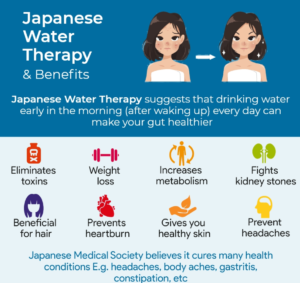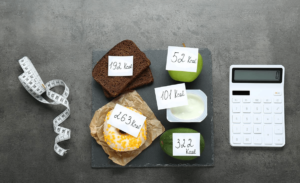Japanese water therapy has been the subject of few scientific studies, and the findings on the efficacy of this practice in promoting weight loss are mixed. However, it is possible that the hydration aspect of water therapy could contribute to weight loss by keeping the body properly hydrated and helping to flush out toxins. It is important to note that weight loss is a complex process, and various factors such as overall diet quality and exercise levels also play a significant role. Therefore, incorporating Japanese water therapy into your weight loss routine may only be effective if combined with other healthy habits.
What is Japan’s Water Therapy?

Japan water therapy is named after its widespread use in medicine and among Japanese people.
Drinking room temperature or warm water on an empty stomach after waking up may help clean the digestive system and improve gut health, potentially helping with various conditions, as per the claims of some supporters.
Many proponents of Japanese water therapy strongly believe that drinking cold water after a meal can adversely affect one’s digestive system. They claim that the low temperature of the water can cause the fats and oils present in the food to solidify, creating a blockage that slows down digestion. This, in turn, can lead to various health issues over time.
To complete the therapy, you should follow these steps daily:
Upon waking up and brushing your teeth, drink four to five 160-ml glasses of room-temperature water on an empty stomach and wait 45 minutes before eating breakfast.
When you eat, take your time and spend 15 minutes. Afterwards, wait at least 2 hours before you eat or drink anything else.
Practitioners recommend different durations of Japanese water therapy for other health conditions.
10 days of constipation,
30 days of high blood pressure and type 2 diabetes,
180 days of cancer
Drinking more water can have health benefits, but there is no evidence that Japanese water therapy can cure diabetes or cancer.
Japanese water therapy is a health practice that involves the consumption of a few glasses of room-temperature water in the morning upon waking up. This routine is believed to impact various conditions positively and has garnered widespread support in recent years. Advocates of this practice assert that it can improve digestion, boost metabolism, increase energy levels, and enhance skin health, among other benefits. While scientific research on the efficacy of this therapy is limited, proponents argue that the practice has been a part of Japanese culture for centuries and is rooted in the country’s traditional approach to health and wellness.
Benefits

Japanese water therapy is a popular but unproven method that has been claimed to provide various health benefits. While there is no scientific evidence to support its effectiveness, drinking sufficient amounts of water can still have several positive effects on the body, such as improving digestion, flushing out toxins, and boosting energy levels.
It’s important to note that implementing this particular therapy protocol may have an impact on your weight, as it involves limiting your calorie intake. This means that you may experience weight loss as a result. It’s recommended that you consult with a healthcare professional before starting any new therapy or diet plan to ensure that it is safe and appropriate for your individual needs.
Drinking more water
Drinking several glasses of water daily as part of Japanese water therapy helps maintain hydration.
Staying hydrated by drinking adequate water is crucial for maintaining optimal brain function, regulating body temperature and blood pressure, and sustaining steady levels of energy throughout the day. Studies have shown sufficient hydration can significantly improve cognitive performance, memory retention, and mood. Moreover, it helps flush out toxins from the body, support healthy digestion, and keep the skin radiant. Therefore, it’s essential to stay hydrated by drinking water regularly.
In addition to its numerous health benefits, drinking more water can alleviate constipation and headaches and prevent kidney stones.
Most people obtain enough fluids by drinking to quench their thirst. If you are active, work outside, or live in a hot climate, you must ensure you drink enough water. This will help keep you hydrated and consume fewer calories than usual.
Japanese water therapy can assist in weight loss by restricting calorie intake.

If you want to lower your calorie intake, drinking water instead of sugary drinks like soda or juice is a good idea.
One effective way to control the amount of calories you consume is by incorporating the practice of limiting your eating windows to shorter durations. This approach involves consuming all your meals within a specific time frame, such as 15 minutes, and abstaining from food for the next 2 hours.
By doing so, you give your body ample time to digest the food you’ve eaten and allow your metabolism to take over. This may help you develop better eating habits over time, such as avoiding late-night snacking or overeating during meals. Additionally, this approach can help regulate your blood sugar levels, reduce inflammation, and improve your overall health and wellness.
It’s important to keep in mind that while adopting a new diet or meal plan may seem like a good idea, it may not be the best choice for everyone. Depending on your specific dietary needs or health condition, some diets may not be safe or suitable for you. It’s crucial to seek the guidance and advice of a qualified healthcare professional before making any significant changes to your eating habits.
A healthcare professional can evaluate your overall health, medical history, and dietary requirements to help you determine what type of diet or meal plan is right for you. By consulting with a healthcare professional, you can ensure that you’re making informed decisions about your diet and that you’re taking the necessary steps to maintain your health and well-being.
One of the benefits of drinking more water is that it can help you feel full and thus reduce your calorie intake. Consuming more water before meals can fill your stomach, making you less hungry and, ultimately, consume fewer calories. Moreover, water has zero calories, meaning you can drink as much as you want without worrying about gaining weight. Additionally, water helps to flush out toxins from your body, keeps you hydrated, and contributes to better overall health. Therefore, incorporating more water into your diet can provide significant health benefits.
The research on the impact of water consumption on weight reduction is inconclusive, with specific studies reporting positive outcomes while others show no effects.
If you enjoyed this post, kindly leave a comment. Also, do review my post on weight loss by clicking here.

One Response